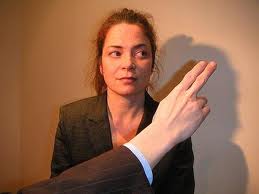In 2006, I
attended training sessions in EMDR
given by Laurel PARNELL of San Diego, California.
EMDR
( Eye Movement Desensitization and Reprocessing
) is a special Cognitive Therapy used for treating
Post-Traumatic Stress Disorder as well as a broader range of
emotional disturbances linked to difficult past life events.
Psychologically traumatized persons treated by EMDR get a lasting sense
of emotional distance vis-Ó-vis their traumas.
Here is a condensed summary of
what EMDR is and how it is used, excerpted from the
site of the EMDR Association of United Kingdom and Ireland,
www.emdrassociation.org.uk.
About EMDR Therapy
EMDR is an acronym for 'Eye
Movement Desensitisation and
Reprocessing'.

Since its
discovery in the late 1980's in the U.S.,
a wealth
of research has been conducted demonstrating EMDR-therapy's benefits in
treating psychological trauma arising from experiences as
diverse as war, childhood sexual and/or
physical abuse or neglect, natural disaster, assault, surgical
trauma, road traffic accidents and workplace harassment.
EMDR
is also increasingly used to help individuals with
many sorts of
emotional issues and
performance anxiety.
It has been found to be of benefit to children as well as
adults.
EMDR is a complex
and powerful therapy. You are strongly
recommended to consult legitimate clinicians who have
undergone a bona-fide EMDR training.
How Does EMDR Work?
When
involved in a distressing event, a person may feel overwhelmed and
their brain may be unable to process the information normally.
The
distressing memories may come to mind when something reminds the
person of
the past event, or sometimes they just pop into mind. The alternating left-right stimulation of
the brain with eye movements, sounds or taps during the EMDR
process, seems
to stimulate the brain's frozen or blocked information processing
system.
In the process the
distressing memories lose their intensity and become more like ordinary memories.
What can I expect from my EMDR therapist?
EMDR-therapy is a comprehensive
therapeutic approach with principles, protocols and procedures
for reducing distress in the shortest period of
time.
You can ask your therapist questions and express any concerns
you may have.
Once you both feel that you are
ready, you can then
target a first distressing memory. Your therapist will ask you to select an image that
represents the distressing event. You will then be asked to
think about negative thoughts, feelings and physical sensations,
and to assess the
"amount" of distress felt.
Your therapist begins
to induce your eye movements while you hold the image in mind.
After each set of eye movements your therapist will ask you what
came to mind.
During the eye movements you may experience the distressing
event quite intensely to start with, but this distress generally
decreases as the memory is processed.
Your therapist will
continue with the eye movements until your distress is reduced
as much as possible. He/she will then ask you to think
about the positive thought or belief (worked out at the
beginning, as an "antidote" to the negative thoughts or
beliefs associated with your distress) and also check whether there your body still feels distress. Before the end
of the session, you will have time to feel calm
again, using the "safe place" exercise and/or relaxation
techniques.
What will I feel like
after the session?
EMDR treatment
generates a certain amount of 'momentum' to your thinking and
conscious awareness. You may feel a bit "bizarre" for a day or
two, as new thoughts, feelings and also dreams may abound.
It
is recommended that you do not do anything too stressful
straight after your session, such as take an exam.
At the end of EMDR therapy, many people report
feeling no distress at all when recalling an event which
used to be very painful for them.
Is EMDR a form of
hypnotism?
EMDR is not
a form of hypnotism. You will remain conscious and in control at all times.
Will I experience any
pain during my session?
No physical pain
in the ordinary sense of the word.
